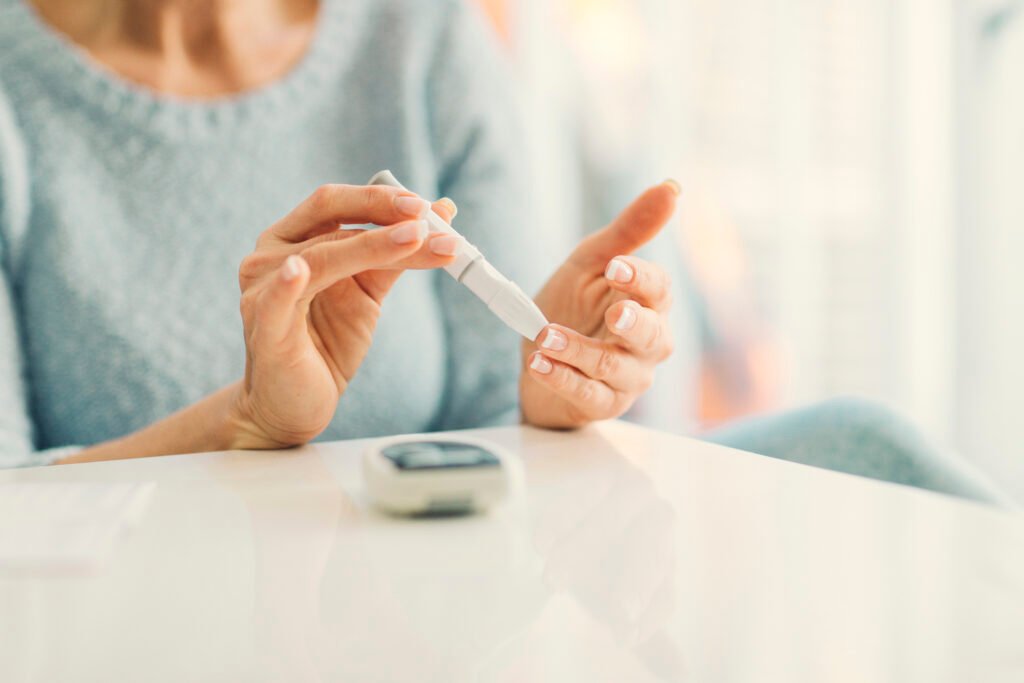
It is estimated that over 50% of the approximately 30 million people with diabetes in the US suffer from numbness, tingling, burning, and/or pain in their feet and legs. In addition to being annoying, these symptoms can also be dangerous. Numbness can cause you to fall because you are unstable when you walk; it is also the leading cause of wounds of the feet. Because your feet are numb you can’t tell if there is a problem, and because you don’t know there is a problem you don’t do what is necessary to protect your feet. Doctors call this LOPS–loss of protective sensation. For example, you may not realize that your shoe doesn’t fit properly, is rubbing your skin, and causing a wound. Or you may not be able to tell that you stepped on something sharp and have punctured the skin on the bottom of your foot. Many times, people with numbness in their feet realize that there is a problem only when they notice blood or drainage on their socks, and that can turn into a big problem—especially in diabetics with poor circulation. Impaired sensation to the feet is the leading cause of amputations of the feet and legs.
If you are a diabetic with numbness in your feet, there are precautions you should take to avoid these problems.
In diabetics, nerve damage caused by nutritional deficiencies is often the cause of these annoying and dangerous sensations. Restoring these vital nutrient levels very often improves these symptoms rapidly and safely.
Research scientists have recently found that a severe deficiency of vitamin B1 is very common in diabetics. In fact, diabetics were found to have 75% less vitamin B1 circulating in their blood than people without diabetes. In addition, many diabetics are deficient in vitamin B12. These deficiencies are likely made worse by the fact that metformin, the most commonly prescribed drug for the treatment of diabetes, is known to block vitamin B1 and B12 absorption from the intestines.
These deficiencies can also cause problems with the brain’s ability to function normally. The brain requires large amounts of energy in order to work properly, and adequate amounts of vitamin B1 and B12 are essential for that energy to be available to brain cells. This can cause problems with your ability to think and reason. It may make you have difficulty focusing your thoughts or making decisions. But simply trying to replace vitamin B1 and B12 by using a multivitamin or a B-Complex formula probably won’t work. You need a specialized formulation specifically designed for your specialized needs.
That’s why I developed Zobria®. Zobria® is a breakthrough formula containing a unique combination of ingredients in just the right dosage to restore vitamin levels fast to help your nerves work properly. People often feel the difference in 30 days.
If this sounds like you or someone you know, it’s important to take the right formula in order to get your levels back into the healthy range—and there is no time to waste. The longer your levels are too low, the greater the chances of a problem.
Zobria Labs, LLC, the maker of Zobria®, is always happy to help. We look forward to addressing your questions and discussing the benefits of Zobria®.
Please send us a message or give us a call
Our customer service professionals are available M-F 9am to 5pm ET. Hablamos Español.
Zobria Labs, LLC
7700 Congress Ave
Suite 3110
Boca Raton, FL 33487
Proudly Made in The USA
60 Day Money Back Guarantee
Patent pending
*These statements have not been evaluated by the Food and Drug Administration. This product is not intended to diagnose, treat, cure, or prevent any disease.